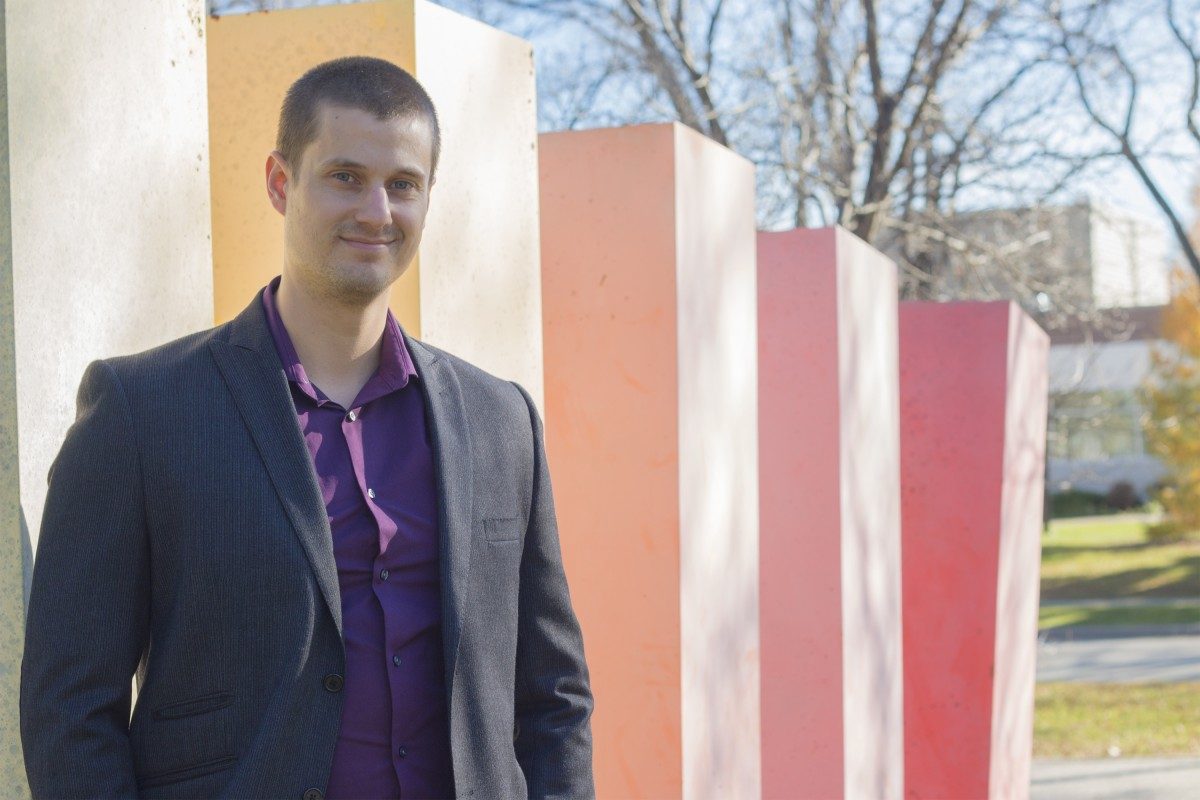
Scott Kehler is a PhD candidate in the Applied Health Sciences program and holds a Sir Gordon Wu Scholarship // Photos by Garrick Kozier
Rising Star
Applied Health Sciences PhD candidate's physical activity research is setting him apart from the pack
When you grow up in Winkler, Man., you eat, sleep, and play hockey. That’s just what you do. And that’s just what Scott Kehler did.
Kehler, 31, who called the small city (about an hour-and-a-half drive from Winnipeg) home for his pre-adult life, took his place between the pipes as a goalie for the most of the hockey squads he played on growing up in the city of around 11,000 people.
It’s interesting how these things work. The current Applied Health Sciences PhD candidate has gone from saving pucks to potentially saving lives.
From a research standpoint, Kehler is dedicated to improving the long-term health outcomes of elective-surgery cardiac patients by researching the benefits of pre-surgery physical activity and exercise. It’s an area referred to as “Preoperative REhabilitation,” or PREHAB.

On paper, Kehler [B.P.E/07, B.Kin/10, M.Sc./12] is credited as the research assistant of a U of M based Canadian Institutes of Health Research (CIHR)-funded PREHAB study being conducted at St. Boniface Hospital.
A glimpse into the study: there’s typically a four-month waiting period for elective cardiac surgery. The current standard of care does not include a referral for exercise therapy and/or educational sessions during this pre-surgery time. Some patients might be told by their healthcare providers not to engage in physical activity. Other patients might simply be afraid to exercise during this time.
“We see this time as a window of opportunity to challenge the dogma of being physically inactive pre-surgery,” says Kehler.
The goal is to demonstrate the efficacy of PREHAB—especially in patients considered to be frail. Frail patients typically recover more slowly from heart surgery. This frailty is mostly due to muscle weakness and inactivity. Therefore, an exercise program before their operation may have long-term and potentially life-saving benefits.
In the PREHAB study, Kehler’s role and title of “research assistant” is a bit of a misnomer. He’s much more than that, according to his PhD advisor, Dr. Todd Duhamel.
Duhamel, the faculty of kinesiology and recreation management associate dean of research and graduate studies, calls Kehler’s exploration into this area unique and novel.
“It’s Scott’s Master’s work (a PREHAB feasibility study that demonstrated preoperative physical activity improved functional walking ability in patients) that leveraged this $620,000 CIHR PREHAB grant to comprehensively explore it with the goal of informing the current standard of care,” says Duhamel.

“There’s not a lot of research in this area. Scott has taken this on to explore what we can do safely during this preoperative period to be able to improve outcomes for the rest of these patients’ lives,” adds Duhamel, who also serves as director of the faculty’s Health, Leisure, and Human Performance Research Institute (HLHPRI).
“That’s really innovative because he’s taken on this notion that patients shouldn’t do anything pre-surgery. His biggest impact is his application of kinesiology in a health research world and it’s really setting him apart. In that respect, he’s established himself nationally.”
Kehler is also making blips on the international radar. His research recently earned him an invite to Copenhagen, Denmark to attend the prestigious and exclusive Saltin International Graduate Course in exercise physiology in health and disease.
The term “happy accident” is sometimes cited when a research or medical breakthrough occurs. It wouldn’t necessarily be fair, however, to say Kehler’s strides are happening by chance. A recipient of the university’s renowned Sir Gordon Wu Scholarship, the PhD candidate has been groomed for the success he’s having.
“He’s been a part of three CIHR Strategic Training Initiative in Health Research programs specifically designed to develop the next generation of outstanding scientists. There’s been a lot of investment put into Scott by the university and beyond. He holds a CIHR Frederick Banting and Charles Best Canada Graduate Scholarship, and he has extensive, high-level training in knowledge translation,” says Duhamel.
“These are very elite programs and scholarships you need to be selected for. Not many students get that type of training, and not many excel at it like Scott.”
Kehler is hesitant to take too much credit for his achievements. He’s quick to acknowledge the role his mentors and HLHPRI affiliates play in guiding him.
Frankly, he’s been set-up to succeed.
“The different perspectives on health care and evidence informed practice I’ve been exposed to by being a part of the HLHPRI and the U of M as a whole has had an impact on my way of thinking about finding solutions.”
A significant aim of the HLHPRI is to facilitate, conduct, and disseminate research of the highest quality to advance understanding of health, leisure and human performance.
“A really great way to answer a question is to look at it from as many different lenses as you can. The [HLHPRI] strives to facilitate partnerships and connections with health care experts across the university and beyond to create answers that have impact,” Duhamel says.
Kehler says if not for the influence of a few academic mentors, he might be doing something completely different with his life.
“I’d probably be a carpenter or an electrician,” he says. “I come from a long line of tradespeople.”
A version of this article is featured in the winter 2017 edition of ResearchLIFE.






